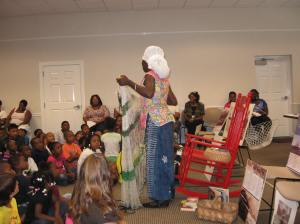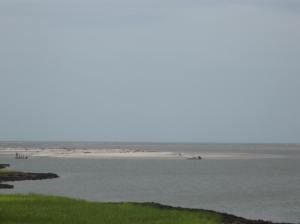Gullah/Geechee SEA and ME: Truly a Cultural Journey
Queen Quet is a friend of mine, with whom I have had the privilege to work with since the beginning of Outdoor Afro. I am more than thrilled to finally host her first blog on the site that shares some of the rich history of the Gullah/Geechee Nation. Enter Queen Quet:
“De wata bring we an de wata gwine tek we bak.”
De wata may tro bak de chillun ef e ain kno how fa ack!
De chillun na de lun de lil one wha fa do
So, ef hunnuh wan um fa kno, den why don’t u?
Disya mi yeddi, so de journee mi tek
Cuz disya culcha got plennee at stake.
Ancestral voices beat against my ear drum as rhythmically as the waves on the Sea Island shore and they beat out the energy within their walks as their souls journey the sands of the sea that we call, “the Middle Passage.” On the shoreline, these voices seem to be joined by the echoes of the polyrhythms whose echoes have never stopped passing through the trees. Sometimes, their sounds simply lower a bit and as we feel them and we then call them the summer breeze,
Pausing beneath a Spanish moss covered oak, one cannot miss the sound if your spirit is in tune and when they send you in a direction, it is best that you go. This is something that you learn as you stay in sync with the Gullah/Geechee flow. I noticed more and more our people being pushed from the shoreline. That push was coming from outside and it was by design. So, it was time to bring the children into the circle so that they could hear and see. This circle became the centering point for “Gullah/Geechee SEA and ME.”
“Gullah/Geechee SEA and ME” is a TogetherGreen action project that I designed in which SEA stands for “saving environmental actions” and ME stands for “marine education.” This year long project will be intergenerational and interactive. So, to engage my initial audience in this journey into environmental education and how it links to our Gullah/Geechee cultural traditions, I decided to bring the youth into the project in the same manner that I would begin-with reading!

250 folks showed up and filled the Colleton Memorial Library in Walterboro, SC in the Gullah/Geechee Nation to standing room only for the “Summer Reading Program.” I presented books that contained information about our waterways and Gullah/Geechee culture as a part of a histo-musical presentation. Within the presentation, I demonstrated how even the youngest (2 year old) and the smallest can do something that collectively adds up to a huge benefit to us all.
I showed everyone how as we walk along our roads to the homes of others or to participate in outdoor activities, we can all carry a plastic bag with us to fill with debris along our way. We can encourage this as a use for the bags that we get when shopping and then make sure that the items therein are properly disposed of so that they do not end up in our ditches and ultimately in our waterways. One small bag a day, could go a LONG way! Everyone saw this and agreed that they would each do this daily throughout the summer.
I then encouraged them to walk to the library or at least walk through it and find books about Gullah/Geechee culture including one of my favorites, “The Water Brought Us” so that they could learn even more about the importance of our culture and the environment in which this culture thrives. I then invited them to come outdoors with me to see our culture alive on Edisto Island, St. Helena, and Hunting Islands as part of “Gullah/Geechee Famlee Days” August 3, 2012 and September 3 (Labor Day) respectively. Those who were interested quickly filled up the sign up sheet.
While preparing for the public “Gullah/Geechee Famlee Days,” I held a private one for the “Gullah/Geechee Fishing Association” in order to engage in a learning experience with them and to have the elders of the association begin to transfer more knowledge to the younger generation. We were joined in this by The Nature Conservancy who decided this would be perfect for a photographic documentary. They captured images that truly tell the story of a Gullah/Geechee fishing day-making a cast net, casting for bait, pulling crab traps, fishing, and then cooking the food and eating with the family. Ain be no oda way fa end a tru Gullah/Geechee Famlee Day!
Hearing an 11 year old and an 18 year old both say how much they enjoyed fishing and crabbing was proof that I had gotten in the right boat with this project! They both want to do more crabbing and even want to see how to economically benefit from selling their catch. So, I am sure that these two will remain with the rest of the program and learn the stewardship and balance that needs to be maintained in order for us to continue to have healthy seafood and waterways. As we get more youths to join these two that came on board at the first event, this will then insure that there will continue to be a Gullah/Geechee seafood industry that incorporates Gullah/Geechee traditional methods of sea work.
At the end of the day, I must say, Gawd tenki tenki! Mi gladdee de chillun lun frum de famlee day fa “Gullah/Geechee SEA and ME!”
Queen Quet Marquetta L. Goodwine is a published author, computer scientist, lecturer, mathematician, historian, columnist, preservationist, film consultant, and “The Art-ivist.” She is the founder of the premiere advocacy organization for the continuation of Gullah/Geechee culture, the Gullah/Geechee Sea Island Coalition. Queen Quet has not only provided “histo-musical presentations” throughout the world, but was also the first Gullah/Geechee person to speak on behalf of her people before the United Nations in Genevé, Switzerland.

